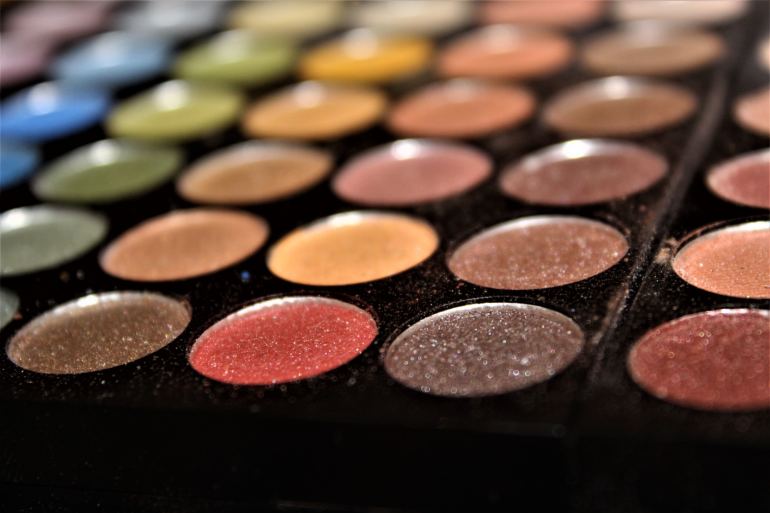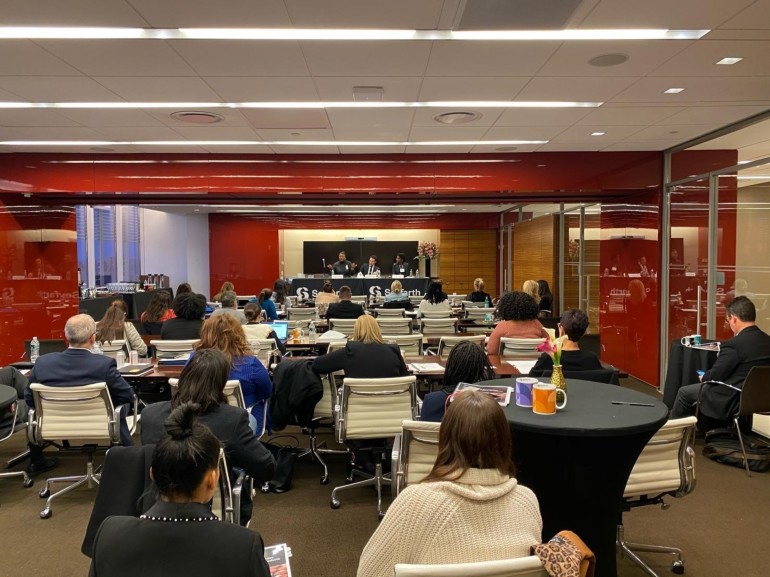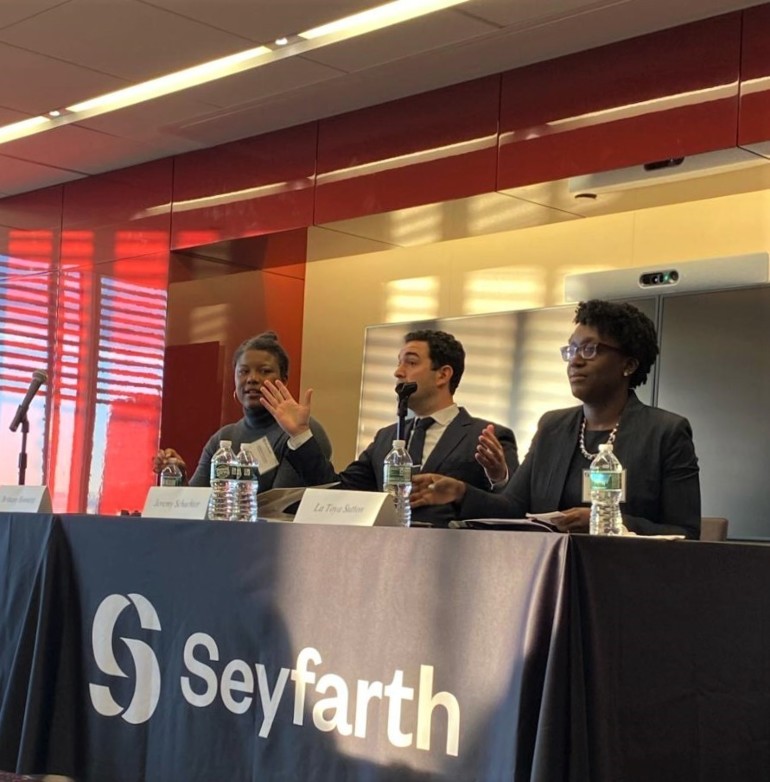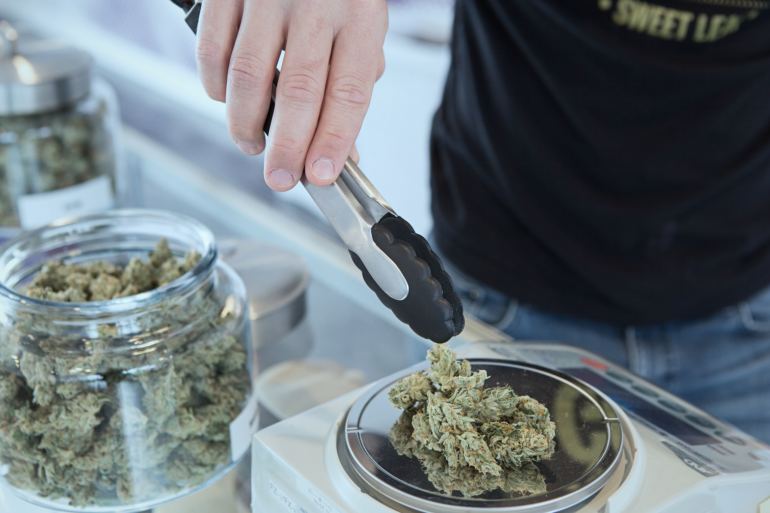Legal Update
Nov 18, 2019
Boss Moves in Makeup: A Look at the Future of Cosmetics

Seyfarth hosted its first “Future of Cosmetics and Personal Care Products" event in its New York office on November 12, 2019. The event brought together industry leaders and Seyfarth attorneys for a timely conversation on the increasing regulatory attention to the marketing and sale of cosmetics and personal care products, as well as front-burner issues related to intellectual property and brand protection.
Seyfarth attorneys Tonya Esposito, Jamaica Szeliga, Renee Appel, and Jeremy Schachter moderated and participated in three panels covering what’s trending in the industry, how companies can protect and defend their brands, and how they can keep up with creative marketing while complying with the changing law. They were joined by:
- Claire Bing of Maesa
- Peter Georgotas of Ethereal
- Joshua Harris of Burford Capital
- David Joyal of Coty
- Mary Ahrens of Hair4Good and BeautyForward
- La Toya Sutton of the National Advertising Division of BBB National Programs
- Brittany Hennessy, a best-selling author and co-founder of Carbon August
The panelists shared their unique perspectives and highlighted the following trends of interest to businesses in 2020 and beyond. Below is a recap of each panel.
#Trending
Panelists: Tonya Esposito, Renee Appel, Claire Bing, and Peter Georgotas
CBD. Even though cannabidiol (CBD) has dominated the marketplace, severe confusion still surrounds this hyped ingredient, including the distinction between hemp versus marijuana derived CBD and the various forms of CBD being used from full spectrum to isolate. While the FDA has yet to create and implement a regulatory framework for CBD, regulators are not standing by idly. The FDA and FTC have recently stepped up enforcement measures and targeted companies making unsubstantiated claims for CBD products and their potential curative properties. Meanwhile, private, plaintiffs’ attorneys have stepped into the class action litigation space with claims that products containing CBD are not as advertised. The panel expects this attention to continue to grow as we enter 2020—although they are hopeful that with pressure from the industry, consumers, and Congress alike, the FDA will act more quickly in devising a regulatory framework to protect CBD users.
“Natural” and “Clean” Products. “Clean” is beginning to replace the popular phenome of “natural” products because it is more all-encompassing, from the actual product ingredients to sustainable product packaging. But “clean” is purely a marketing term that is undefined and unregulated. Companies might be eager to capitalize on the lack of regulatory clarity and market products under this umbrella, undefined term. Retailers have been taking a leading role in developing “clean” campaigns and marking products that meet their definition of “clean” to raise greater interest among consumers. However, most of the ingredients that retailers claim their “clean” products are free of, are ingredients that are no longer used in the industry anyway. Meanwhile, “natural” claims are still working their way into class action litigation where products are advertising as natural but contain synthetic ingredients. The same may follow with the “clean” space to the extent the claims are rendered misleading to consumers.
As the industry moves toward the use of “clean” and “free of” marketing terms, the panel also explained that preservatives may have gotten a bad reputation. Preservatives are essential to preventing eye, skin, and other types of infections because they mitigate the risk of contamination and serve to prevent the spread of bacterial growth. Companies need to engage in a cost-benefit analysis when deciding to remove preservatives for the sake of marketing purposes.
In similar lexicon, retailers should be aware that “organic” is a regulated term, while “vegan” is not. Companies need to ensure that their product marketing is legally compliant when using these popular words because the verbiage is not treated as mere puffery; rather, it must actually be backed with competent and reliable support.
Product Sourcing. CBD, while prevalent, must be sourced responsibly and safely. The panel discussed the need for testing and validation of raw material sourcing, particularly when the product is sourced from China because of the prevalence of contaminants. Companies need to be especially mindful that the FDA requires disclosures concerning safety testing. Issues with sourcing doesn’t stop just with safety, however. In the growth of “clean beauty,” resources should also consider sustainable production especially given changing consumer awareness of environmental issues. These sentiments are further magnified by social media.
Risk Management. Business leaders must understand the legal ramifications of their decisions by partnering with trusted advisors, yet must also weigh the legal risk with the business prospects. As the CBD space continues to heat up, by 2021 many major beauty conglomerates will likely enter the market. For now, they are watching and learning from the independent beauty sector. It is critical for businesses to employ practical solutions to challenges created by the shifting regulatory environment. And they must do so if they want to be the first movers in a market that is expected to mature rapidly.
Protecting Your Brand
Panelists: Jamaica Szeliga, Mary Ahrens, Joshua Harris, and David Joyal
Patents. Critical for any business, IP protection remains an ever-growing concern. The speed at which copycats can act, especially those involved in the supply chain, makes patenting designs and ideas especially important. While the costs of obtaining a patent may be relatively high (upwards of $10,000), this may be a worthwhile investment. The panel recommended making patent applications to cover not only your patent as is, but also to cover any critical path to the function of the product. The panel further discussed the factors at play in deciding where to pursue patents internationally.
Litigation Funding. Litigation funding may be able to assist patent holders in their enforcement efforts. Yet patent holders must remain aware of not only the financial costs with a prolonged court battle, but also emotional costs. Moreover, litigation funding is only available when cases have merits and have the potential to garner a positive return on investment.
“District of Amazon.” Businesses now have multiple means of enforcing their IP, at ever decreasing costs. Amazon recently announced a new option for its sellers to enforce their patents against infringers. In the trial program, a third-party patent attorney adjudicates disputes over whether another product (sold on Amazon) infringes on the patent at issue, providing relief in just a few months compared to the years required for the USPTO or district court to resolve a dispute. Meanwhile, trademark owners may also avail themselves to the Amazon Brand Registry, which provides a quick takedown procedure of infringing products. Removal of such trademark-infringing products can happen in a matter of days under this procedure. Through these Amazon-enforcement venues, parties are potentially able to avoid costly litigation (something that can go into the millions, depending on the venue) and quickly resolve their disputes. Businesses should keep these options in mind going forward into 2020.
Marketing in 2020
Panelists: Jeremy Schachter, La Toya Sutton, and Brittany Hennessey
Dealing with Reviews/Endorsements. Businesses need to understand that in many situations, they can and will be held responsible for the content of consumer reviews and endorsements of their products.
- Adopting Legitimate Reviews. The more control advertisers exercise over reviews of their products, the more likely they will be held responsible for the content of those reviews. For example, an advertiser would not be responsible for a false or misleading claim made within a legitimate, independently created consumer review posted on a third party website. But if the advertiser takes that review and prominently posts it on its own website, or otherwise indicates its approval of the claims made within the review, the advertiser exposes itself to liability for false advertising.
- Creating Fake Reviews. Unsurprisingly, directing the creation of entirely fake reviews is also unlikely to end well. The FTC recently came down hard on cosmetics maker, Sunday Riley, for doing just that, and indicated that similar conduct (which is unquestionably deceptive) will be met with even harsher penalties in the future.
- Silencing Legitimate Reviews. The Consumer Review Fairness Act (CRFA) makes it illegal for businesses to contractually preclude consumers from posting reviews. Many businesses have such restrictions in the terms and conditions of their websites or other consumer agreements without even knowing it. In 2019, the FTC went after—and imposed monetary penalties against—numerous businesses for having such contract terms, even though many of them did not even attempt to enforce those provisions. Advertisers would be wise to audit their existing form agreements to ensure that they do not contain such terms.
Influencer Marketing. The influence of influencers continues to grow. But influencers often do not know (and may not care) about the steps they must take to disclose when they are being compensated for their endorsements on social media. And while influencers are partially responsible, the primary burden is on the brand owner to make sure that its influencers are complying with the rules. As a supplement to its long-existing endorsement guides, the FTC released updated guides for influencers in November 2019. Influencers and advertisers alike must familiarize themselves with, and implement, the latest FTC guidance for 2020.
Seyfarth Shaw LLP provides this information as a service to clients and other friends for educational purposes only. It should not be construed or relied on as legal advice or to create a lawyer-client relationship. Readers should not act upon this information without seeking advice from their professional advisers.





